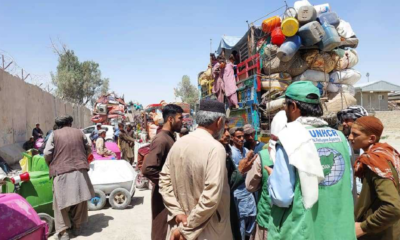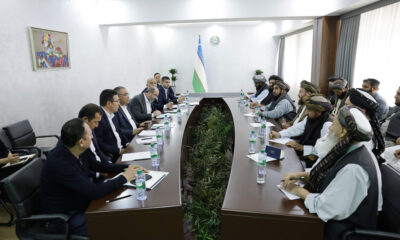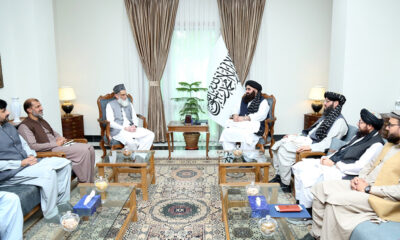Latest News
Muttaqi calls for cooperation and not criticism by foreign community
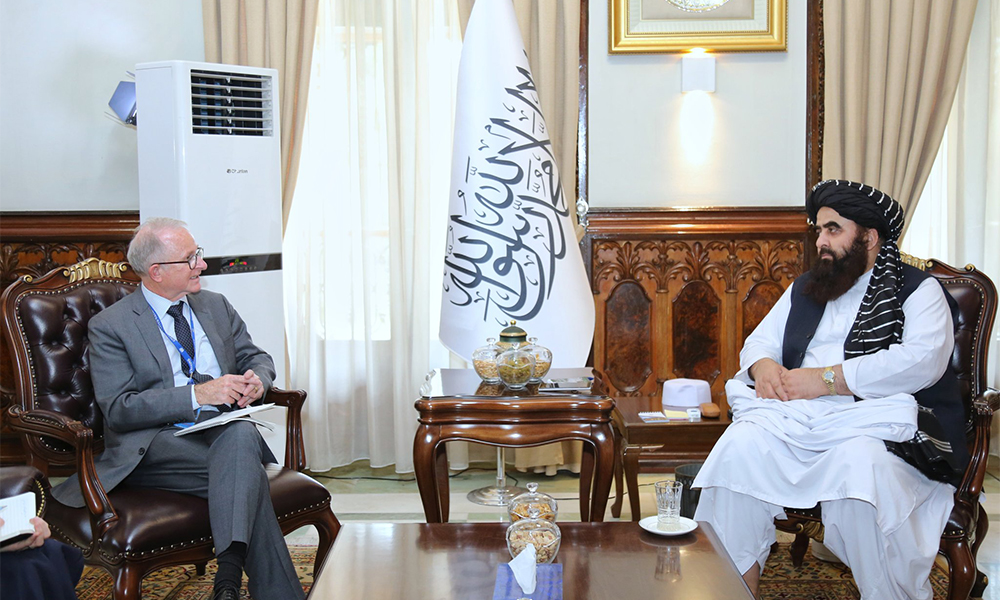
Afghanistan’s Foreign Minister Amir Khan Muttaqi has told the UN Special Rapporteur on Human Rights Affairs of Afghanistan that the organization should work with the Islamic Emirate of Afghanistan (IEA) instead of criticizing it.
He said the days of warlords, kidnappers and land grabbers violating people’s rights was over.
“Instead of criticizing each other, we should cooperate, publish the facts and spread any progress that has been made. The human rights situation in Afghanistan is such that warlords, kidnappers and land grabbers can no longer violate anyone’s rights,” read a statement issued by the foreign affairs ministry.
On the other hand, Abdul Salam Hanafi, deputy prime minister, said in a separate meeting with Richard Bennett, the visiting UN special rapporteur on human rights affairs, that security has been achieved throughout Afghanistan, and the Islamic Emirate is committed to protecting the life, property and dignity of all citizens, especially women’s Sharia rights.
However, some experts have said that dialogue between UN officials and the Islamic Emirate can pave the way to solving many issues, especially around the provision of women’s rights and the formation of an inclusive government.
Bennett meanwhile said his visit was aimed at monitoring and evaluating the situation around girls’ education, women’s rights, media activity, security of Sikhs and other religious minorities, cooperation and consultation in improving the human rights situation in Afghanistan.
Latest News
Return of Afghans from Pakistan could worsen already dire humanitarian situation: IFRC
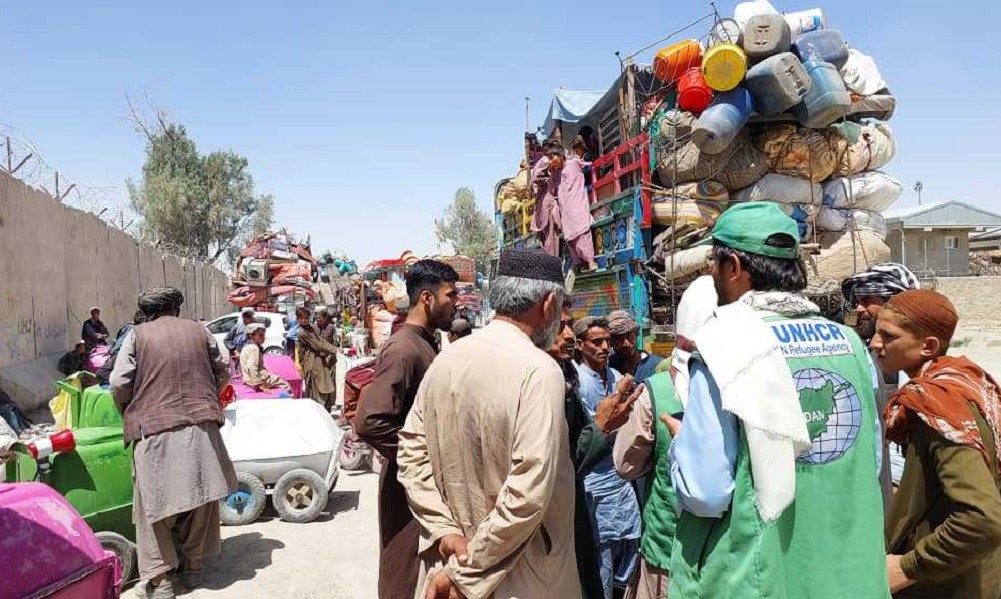
Return of Afghans from Pakistan could worsen already dire humanitarian situation in Afghanistan, the International Federation of Red Cross and Red Crescent Societies (IFRC) warned on Monday.
After decades of seeking refuge in Pakistan, up to a million Afghans could return to Afghanistan following a directive by the government of Pakistan which would require all Afghans without valid visas to leave the country by 31 March 2025.
IFRC said in a statement that the humanitarian needs of people returning to Afghanistan are high. Many have abandoned their livelihoods and personal belongings in Pakistan. Children, many of whom are already malnourished, need specialized care. Many families have been separated during the journey and need support to restore family links. Longer term support will also be needed to help people to re-establish their lives in Afghanistan.
Shahabuddin Delawar, the Acting President of the Afghan Red Crescent Society (ARCS), emphasized the urgent need for action.
“People returning are facing numerous challenges that they cannot navigate alone. Women and children represent a significant portion of those returning, and ensuring their safety and well-being must be our top priority. As a local organisation with a presence across the country, our aim is to provide immediate relief and long-term support to help people rebuild their lives safely and with dignity.”
Ahmed Suliman, the interim Head of Delegation for the International Federation of Red Cross and Red Crescent Societies (IFRC) in Afghanistan, expressed concern about the potential scale of the crisis.
“This dynamic situation will impact millions of people. Addressing immediate needs – such as food, healthcare, and shelter – is our top priority, while also planning to support people in the longer-term. The IFRC and National Societies are working alongside ARCS to tackle these challenges and provide tailored support people most in need,” he said.
IFRC said that currently, conditions in Afghanistan are not conducive for sustainable return and reintegration of large numbers of people, amid high levels of malnutrition and a struggling economy. There are also millions of internally displaced people in the country. Existing humanitarian support is insufficient to meet current needs and will only come under more pressure as higher numbers of people return.
It emphasized that all returns must be voluntary, safe and dignified. IFRC also called on the international community to provide adequate support to meet the growing humanitarian needs of people returning to Afghanistan.
Latest News
Afghanistan and Uzbekistan to expand cooperation in agriculture sector
Omari, led a high-level delegation from Afghanistan to Uzbekistan last week to engage in discussions with Uzbek authorities regarding regional collaboration and key agricultural matters.

Uzbekistan has expressed Tashkent’s willingness to cooperate with Afghanistan on various issues across the agriculture sector.
According to a statement issued by Afghanistan’s Ministry of Agriculture, Irrigation and Livestock, Uzbek Agriculture Minister Ibrokhim Abdurakhmonov met with his Afghan counterpart Attaullah Omari in Tashkent and pledged cooperation with Kabul.
Omari, led a high-level delegation from Afghanistan to Uzbekistan last week to engage in discussions with Uzbek authorities regarding regional collaboration and key agricultural matters.
The objective of the visit was to address the challenges, posed by climate change, on the water reserves of the Amu Darya River basin; and fostering enhanced cooperation between the two nations in agriculture, irrigation, livestock management, food security, capacity building, and related spheres.
At the meeting, Omari underlined the importance of expanding agricultural cooperation and highlighted investment opportunities in this sector and other related areas.
He reaffirmed the Islamic Emirate’s commitment to providing all necessary facilities for foreign investors, including those from Uzbekistan.
Omari also called for the exchange of agricultural technology and expertise between the two countries, saying Afghanistan urgently needed to boost its agricultural production given current circumstances.
“We must work together to enhance agricultural output not only to meet domestic needs but also to contribute to reducing global poverty,” the minister commented.
For his part, Abdurakhmonov reiterated Tashkent’s commitment to greater collaboration with Kabul at various agricultural initiatives.
He noted Uzbekistan had a significant demand for agricultural products and said Afghanistan could play a vital role by supplying cotton, rice, fruits and vegetables.
He assured Uzbekistan was ready to provide Afghan farmers with improved seeds and purchase their products after harvest.
Latest News
IEA informs Pakistan envoy of it’s ‘regret’ over forced deportations of Afghan refugees
Muttaqi voiced his disapproval during a meeting with Pakistan’s Chargé d’affaires to Afghanistan, Obaidur Rehman Nizamani.
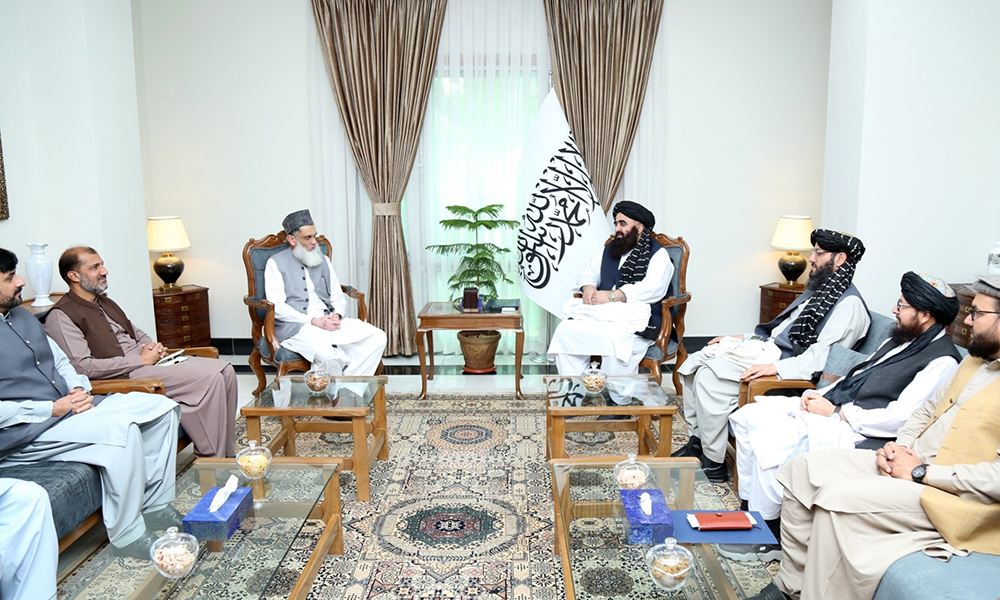
Afghanistan’s Minister of Foreign Affairs, Amir Khan Muttaqi, on Monday expressed regret over forced deportations of Afghan refugees from Pakistan, and of the “inappropriate” treatment being dealt to them.
Muttaqi voiced his disapproval during a meeting with Pakistan’s Chargé d’affaires to Afghanistan, Obaidur Rehman Nizamani.
According to a statement issued by Afghanistan’s Foreign Minister the “Chargé d’affaires of the Pakistani Embassy said that it understands the concerns of the Islamic Emirate and will share the issue with the relevant organizations.”
Pakistan has meanwhile ramped up its deportation of Afghan refugees
In a report released on Sunday, April 13, the International Federation of Red Cross and Red Crescent Societies (IFRC) warned that the “scale and scope of the ongoing returnee crisis is both staggering and rapidly escalating.”
The report noted that projections from the International Organization for Migration (IOM) estimate that from April 1, approximately 20,000 people will cross into Afghanistan from Pakistan – through Torkham (13,000) and Spin Boldak (7,000) border crossings.
“This anticipated daily surge calls for an urgent, well-resourced, and long-term strategy to meet the needs of returnees and reinforce overstretched humanitarian systems,” IFRC said.
Early last month, the Pakistan government issued a directive mandating that all Afghan Citizen Card (ACC) holders must leave the country by March 31. This directive has since led to intensified enforcement measures, with many returning refugees reporting that police have been mistreating the refugees and confiscating possessions and property.
There are an estimated 2.8 million Afghans in Pakistan, of whom approximately 1.4 million are either unregistered or undocumented. The Pakistani authorities’ actions pose a significant risk to an already fragile community recovering from decades of conflict, recurring disasters, and economic challenges.
The IFRC meanwhile stated that recent reports indicate that the Pakistan government has commenced demolishing unauthorized settlements occupied by undocumented foreigners, further heightening fears among Afghan migrants.
“The repercussions of these actions have sparked a notable surge in returnees,” the IFRC report stated.
The registration process for returnees, managed by authorities with support from IOM, has meanwhile become overwhelmed due to the staggering number of individuals arriving at border crossings. This has resulted in delays and prolonged stays in transit centers, complicating the reintegration process for returnees, the organization stated.
“As the situation unfolds, the health, safety, and well-being of these returnees—especially vulnerable groups such as women, children, the elderly, and individuals with disabilities—are of paramount concern. The existing pressures on limited humanitarian services and resources are exacerbated by the fact that many humanitarian organizations have scaled down or ceased operations due to funding constraints, particularly following reductions in support from major donors.
“Given these pressing humanitarian needs, there is an urgent requirement for comprehensive support, including access to medical care, adequate shelter, and essential supplies.
“This is critical to address the dire conditions faced by the returnees and to mitigate the humanitarian impact of this large-scale population movement. Coordinated efforts are essential to ensure the safety and well-being of all individuals involved, particularly considering the evolving dynamics of this humanitarian crisis.,” the organization stated.
-

 Regional5 days ago
Regional5 days agoAre B-2 bombers a message to Iran? ‘We’ll let them decide,’ Pentagon chief says
-
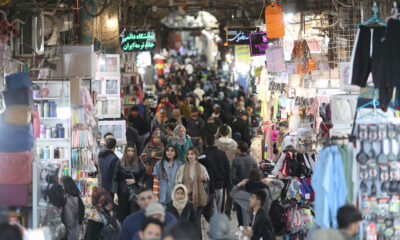
 Regional5 days ago
Regional5 days agoAnxious Iranians hope nuclear talks may ease risk of US attack
-

 Latest News5 days ago
Latest News5 days agoUS House panel approves bill to prevent aid falling into IEA’s hands
-
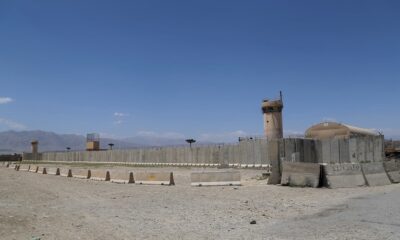
 Latest News3 days ago
Latest News3 days agoNo American military presence in Bagram: US defense official
-

 Sport4 days ago
Sport4 days agoAfghanistan A registers massive win over Ireland A in 4-day match
-
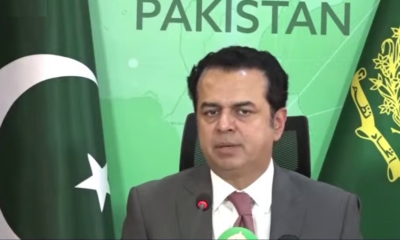
 Latest News3 days ago
Latest News3 days agoNo new deadline will be given for Afghan refugees: Pakistani official
-
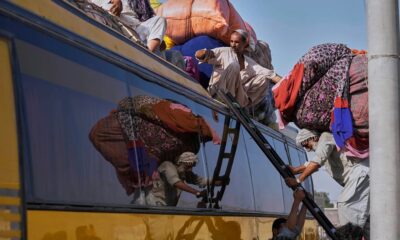
 Latest News4 days ago
Latest News4 days agoPakistan warns it may expel thousands of Afghans hoping for resettlement in the West
-

 World5 days ago
World5 days agoTrump U-turns on tariffs but keeps trade war heat on China




